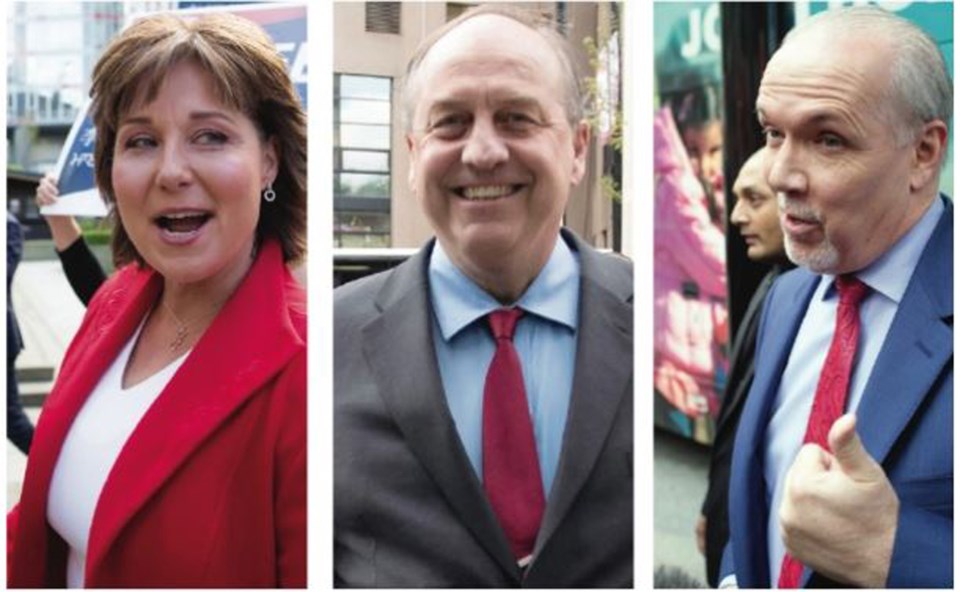The political commentariate is ruminating over dozens of “what if?” scenarios following Tuesday’s provincial election, which resulted in a hung legislature.
By the end of the night, the B.C. Liberals had 43 seats, one shy of the number needed for a majority government. The B.C. New Democrats finished just two seats back with 41, leaving the B.C. Green Party potentially in the role of kingmaker with three MLAs elected.
“All three leaders gave victory speeches last night,” said UBC political science professor and North Shore resident Gerald Baier at a post-election forum Wednesday morning. “And so it is by no means finished ... .”
Baier said the dynamics of the house, “once it’s finally constituted” will dictate what happens next.
The unofficial results showed province-wide, the Liberals finished with 40.85 per cent of the popular vote, down about four per cent from 2013. The NDP had only a marginal 0.14 per cent bump in popular support to 39.85 per cent. The Greens more than doubled their share to 16.74 per cent.
Liberal leader Christy Clark told reporters Wednesday that she’d met with the lieutenant-governor and been asked to continue on, and that Prime Minister Justin Trudeau had called to congratulate her.
But Clark was somewhat contrite, acknowledging her party had seen both its seat count and popular vote diminished, and that she may have to court the Greens’ support.
“To me, the voters are never wrong and we got a result from the voters and British Columbians told us what they want really out of this election – that we make sure we do things differently. They elected a really significant Green presence and certainly a lot of people voted for the Greens across the province. And so I intend to listen to that,” she said.
NDP leader John Horgan spoke to the press later in the day, emphasizing that 60 per cent of British Columbians had “voted for a new government,” leaving the door open to some form of NDP-Green coalition.
“I’m prepared to work with anyone who want to make life better for British Columbians,” he said, listing a number of a pieces of the NDP platform.
Green Party leader Andrew Weaver was the last to address the media Wednesday, saying it was too soon to say which party he would support.
“The No. 1 deal-breaker right now is banning big money in B.C. politics,” he said. “We need to reclaim democracy for the people of British Columbia.”
On other issues, he added, “We are willing to negotiate.”
But all of it may be a moot point.
With more than 170,000 absentee ballots that won’t be counted until May 22, some of the razor-thin ridings may flip entirely, delivering one party or another a majority of seats in the legislature.
Political science professor Kathryn Harrison suggested building a coalition may be more complicated than it seems.
“I think, in general, the high-profile policies in the Green platform are closer to the NDP, but it’s not clear that the leaders are so close, nor necessarily that their voters are,” she said, noting the popular narrative that the Greens split the vote isn’t supported by the results.
In three ridings she examined, it appeared the Greens may have split the left vote and allowed the Liberals to win, but there were eight ridings where the increase in Green vote share appeared to come disproportionally from the Liberals.
“That interpretation is not that the Greens hurt the NDP and allowed Christy Clark to win but in fact the NDP would have done worse in this election had it not been for the Green vote,” she said.
Across the North Shore’s four ridings, Liberal support dropped by 7.46 per cent, while the Green vote share was up 13.26 per cent from the last election.
The NDP had only a 0.48 per cent increase in popular vote over 2013.
How a coalition government would impact something like the Kinder Morgan pipeline expansion, which was a major issue on the North Shore and is opposed by both the NDP and Greens, is also far from clear, Harrison added.
“Mr. Horgan has said he would use all of the tools at his disposal but hasn’t been very specific about what those are,” she said.
“I think there are a lot of ways a provincial government might make noise. It would be difficult to stop it.”
And, Harrison added, the current government has not released the details of the agreement with Kinder Morgan so we don’t know what financial penalties might be written into it in the event a government attempted to withdraw.



